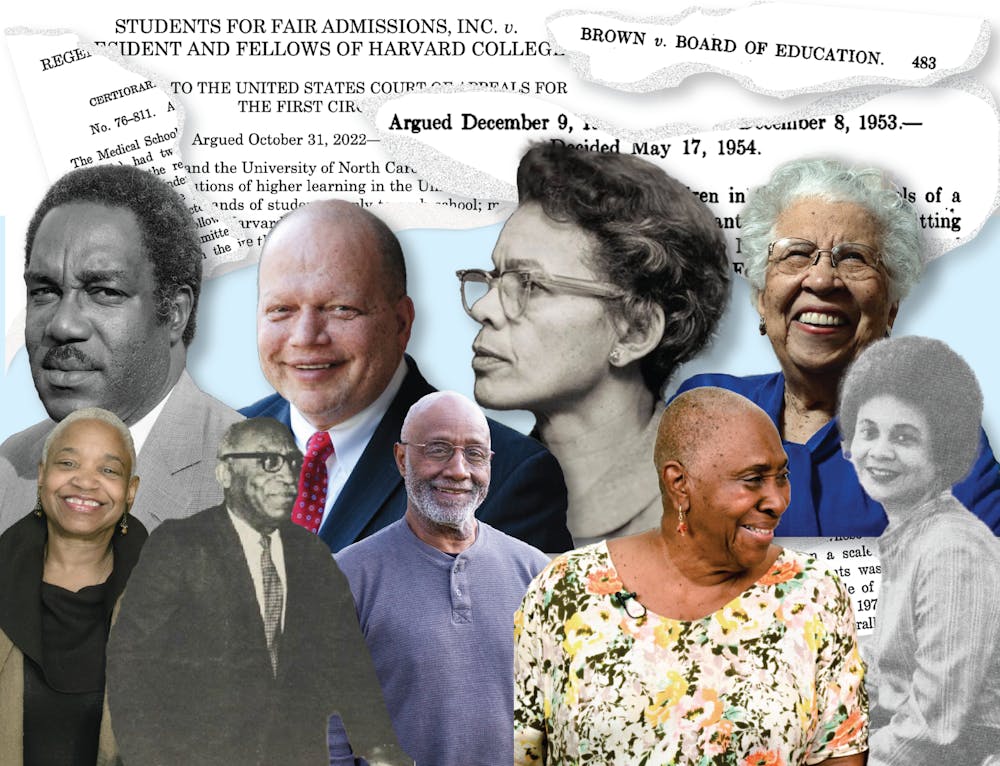After a federal court order, the UNC School of Law admitted the University’s first Black students in 1951. Black students were admitted to other schools within the University only after Brown v. Board of Education was decided in 1954.
Mason-Hogans said that, while conversations about equity in admissions are important, people should also focus on how students are set up for success before college.
“There has been a history of promise and a history of not living up to that promise in Chapel Hill,” she said. “Meanwhile, the achievement, and therefore opportunity gap, for Black students in Chapel Hill who are generationally from here has been as wide as it ever was since schools desegregated in 1966.”
A 2018 Stanford study found Chapel Hill-Carborro City Schools to have the second-largest achievement gap between Black and white students in the U.S.
Factors in admissions
Erika Wilson is a professor of law at UNC and director of the Critical Race Lawyering Civil Rights Clinic, where students merge critical race theory with the practice of civil rights law.
Wilson, who has worked in admissions for several law schools, said there were factors other than affirmative action that could give applicants an advantage.
“There’s a false assumption that college admissions is 100 percent meritocratic and fair,” she said. “That colleges are just looking at tests and grade scores and picking the best candidates based on tests and grade scores. That is 1,000 percent false.”
One example, Wilson said, can be found in legacy admissions.
Legacy preference applies to students whose parents, grandparents or great-grandparents attended the institution. Because UNC restricted admissions to white applicants until the early '60s and admitted very few Black students until the '80s, Wilson said, legacy admissions primarily benefit white students.
According to a letter sent by the vice provost for enrollment and undergraduate admissions in 2018, 48 percent of in-state applicants who were children of alumni were accepted the previous year, while 40 percent of those out-of-state applicants were accepted.
For that application year, UNC’s acceptance rate was about 23 percent overall.
To get the day's news and headlines in your inbox each morning, sign up for our email newsletters.
When taking these other factors into account, affirmative action measures end up being a conservative course correction, Wilson said. She said this is because people from racially marginalized groups have been disadvantaged historically by conditional admissions markers and processes.
Visions for the future
The Court's decision will change how and where applicants can address race-related topics in their applications to universities.
"I read the Supreme Court decision as a call to universities who are genuinely concerned about maintaining racial diversity to more carefully read the essays and to engage in more of an individualized assessment of individual applicants," Wilson said.
She also said future litigation could push universities like UNC that have a documented history of racial discrimination to enact remedial admissions programs.
Mason-Hogans said the University and Town of Chapel Hill need bold leadership and targeted programs for the descendants of enslaved workers at UNC. She said the announcement from Chancellor Kevin Guskiewicz about free tuition for households who make under $80,000 was a good start, but more work needs to be done.
Shaw said he wants the University to continue to hold its value of inclusivity both in spirit and in lived experiences.
"I hope frankly that the University doesn't embrace a legal regime in which people are excluded on the basis of race," he said. "And I hope somehow, the University finds a way to continue to embrace inclusiveness — and it's the University's task to figure out how to do that."
@dailytarheel | university@dailytarheel.com
Emma GeisEmma Geis is the 2023-24 copy chief at The Daily Tar Heel. She has previously served as a copy board member and summer copy chief. Emma is a fifth-year pursuing a double major in journalism and media and African, African American and Diaspora Studies.



